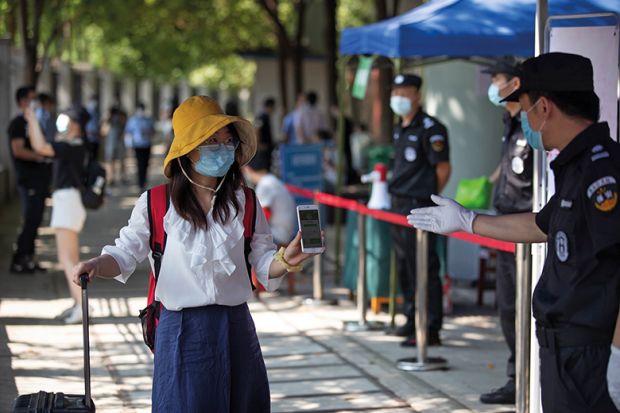Location-tracking apps that were swiftly adopted by many Chinese universities at the height of the country’s Covid-19 outbreak are still being used daily several months later, raising fears that their use has become normalised.
The widely used “health check-in” tools typically combine a simple questionnaire – asking whether the student is experiencing coronavirus symptoms, has had contact with a confirmed case or has travelled to a high-risk area – with the option to automatically upload their location information.
One university student, who asked to remain anonymous, said that their university required them to check in twice a day at stated time slots, even while they were at home during the holidays. Failing to do so, the student said, would result in their being counted as absent.
Some students have also complained online that these records are being directly linked to assessments and performance reviews.
Location-based check-ins are nothing new on Chinese campuses, with universities using them to monitor class attendance. Campushoy, a mobile app that provides a range of digital services, says it is partnering with more than 400 higher education institutions, while Perfect Campus, a similar application that proudly touts its use of facial-recognition technology, claimed to have secured 1,000 university clients as long ago as 2018.
However, the requirement for health check-ins has pushed the volume of location data collected by such apps to another level.
Liu Deliang, a professor of law at Beijing Normal University, told Times Higher Education that universities were “the epitome of the whole society’s battle against the virus in China, where personal interests yield to social interests”. “It needs careful scrutiny that Covid-19 temporary measures should stop when the pandemic is over,” he said.
Professor Liu said that academics at his institution were required to complete similar health reports every day.
Although these apps usually state that security technologies have been applied, some have reportedly violated regulations. Last month, Campushoy was criticised by the Cyberspace Administration of China for lacking effective means of handling personal data complaints and account deletion requests.
Some products are keen to promote their “one-click data export” feature, allowing teachers to save student data on local devices without data masking.
The fundamental challenge facing China lay in the gap between the excessive number of organisations collecting personal data and regulations governing this scattered across various laws, said Shen Kui, professor of law at Peking University, in a seminar held earlier this year which examined the balance between protecting public health and personal privacy.
“Our current mode of monitoring should not be the ‘new norm’,” Professor Shen said. “Collecting and storing personal data under this mode require intensive protection. At some point it must be abandoned for a better future of our privacy and personal data.”
POSTSCRIPT:
Print headline: Privacy fears as China continues to collect students’ location data
Register to continue
Why register?
- Registration is free and only takes a moment
- Once registered, you can read 3 articles a month
- Sign up for our newsletter
Subscribe
Or subscribe for unlimited access to:
- Unlimited access to news, views, insights & reviews
- Digital editions
- Digital access to THE’s university and college rankings analysis
Already registered or a current subscriber? Login








